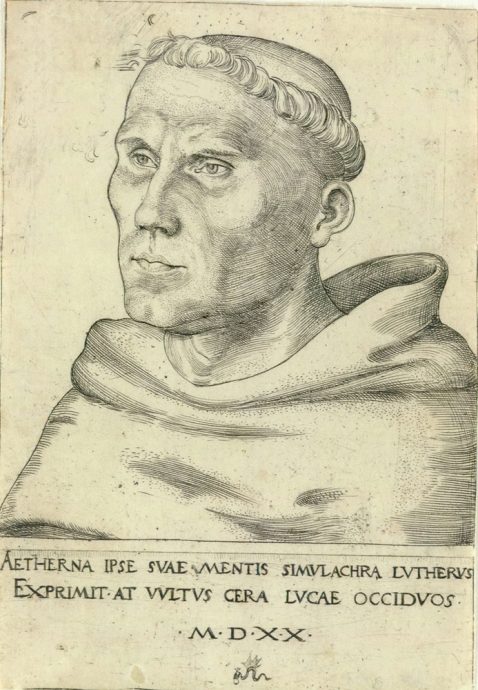One might be forgiven for thinking that today’s Republican Party is an American Christian Democratic party in everything but name only.
Luther's Revolution
The Morgan Library’s Exhibition, “Word and Image: Martin Luther’s Reformation” commemorated the 500th anniversary of the 95 Theses, Luther’s bill-of-particulars against the sale of indulgences that instigated the Protestant Reformation and changed the course of world history.
The collection is truly amazing. In addition to paintings and woodcuts by Cranach, Durer and other Renaissance masters, it has historical documents never before seen in this country. The exhibition contains an actual indulgence—a receipt for the donation of money to rebuild St. Peter’s Basilica in Rome; one of the six remaining broadside editions of the 95 Theses themselves, as well as popular pamphlets and sermons by Luther, which enterprising printers distributed throughout Europe; the papal bull and the imperial edict condemning Luther and his works; and pieces of propaganda from both sides. There are autographed letters from Luther and others that show struggles behind the scenes, including an amusing one in which Luther requests that the authorities not agree to provide him safe passage, so that he can avoid appearing before a Church tribunal. The letters also suggest how Luther’s protests got away from him and led to a civilization-changing conflict neither side anticipated.
Most incredible of all, there are Luther’s handwritten notes of his testimony at his trial before the Diet of Worms in 1521, in which he refused to recant his controversial statements about Church authority. The notes break off before the famous ending, which Luther may have delivered extemporaneously:
Unless I am convinced by the testimony of the Holy Scriptures or by evident reason-for I can believe neither pope nor councils alone, as it is clear that they have erred repeatedly and contradicted themselves-I consider myself convicted by the testimony of Holy Scripture, which is my basis; my conscience is captive to the Word of God. Thus I cannot and will not recant, because acting against one’s conscience is neither safe nor sound. God help me. Amen.
The Morgan doesn’t expressly take sides in the historical dispute between Luther and the Catholic Church, but it’s pretty clear where its sympathies lie. The exhibition gives Luther’s arguments against indulgences and Church authority pride of place; although it notes some of the Church’s responses, it downplays them. On my visit, I overheard a docent explain to her tour group that the Church taught that just by following its rules one could be assured of a place in Heaven. I’m not a catechist, or even a Catholic, but I’m pretty sure that’s a simplistic statement of contemporary Catholic theology, and no doubt was in Luther’s time as well.
Why does the Morgan favor Luther in his debate with the Church? It’s not because the management is Lutheran. It’s because, whatever the debate within Christianity on Faith versus Works—and both Lutheran and Catholic theology show more nuance than people typically understand—in the secular world, Luther has come to stand for the overthrow of traditional authority in favor of individual subjectivity. We typically mean something very different by “conscience” than he did in that statement at Worms, but his emphasis on individual conviction rather than received wisdom anticipates the preeminence of personal authenticity as a social and political value. That’s why Luther continues to appeal to our wider culture today.



